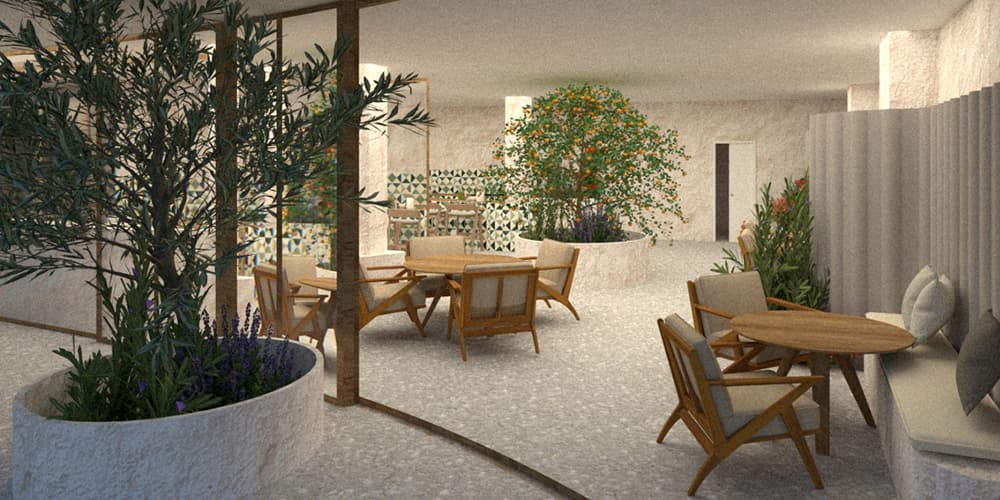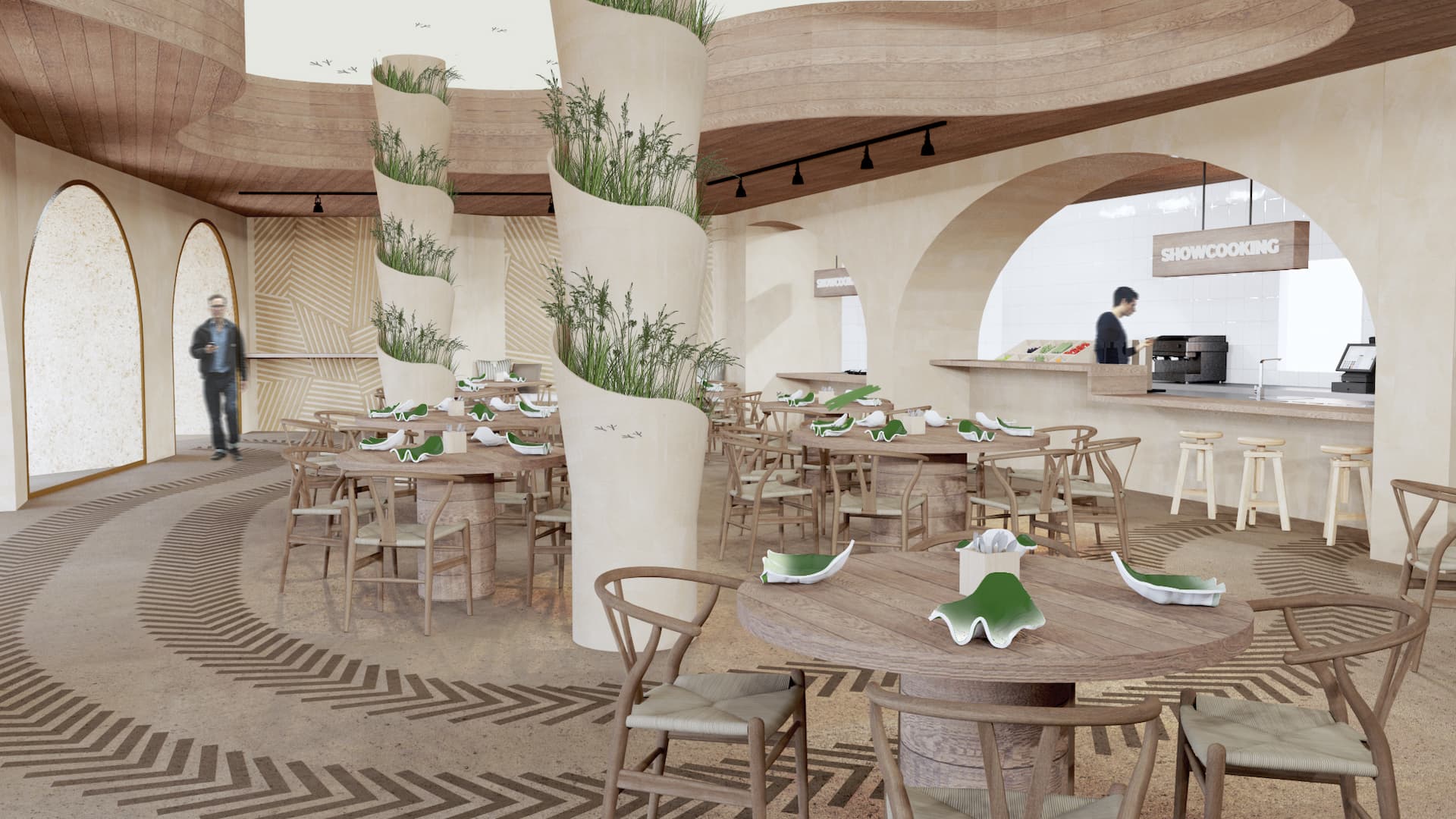BA Interior Design
BA Interior Design

Study Interior Design
The interior designer has evolved greatly over time, becoming a key player in the development of contemporary living spaces. The design of spaces for the habitat, the studio, commercial spaces or even sanitary facilities cannot be understood today without an interior designer.
At ESADA we offer the Official Degree in Interior Design, which is a qualification from the Ministry of Education equivalent to a university degree for all purposes. These studies are part of the European Higher Education Area (EHEA) and are therefore valid internationally.
If you dream of creating meeting spaces that respond to contemporary culture, anticipate change and dialogue with our past, this is the profession for you!

Studying Interior Design will allow students to acquire a large number of skills to tackle the different disciplines that make up their work (architecture, graphic design, decorative arts, furniture and lighting design, textiles...). All these skills have to be learned in a practical way with methodologies that respond to what students will really need for their professional development.
ESADA's main interest is to guide students in their training until they become professionals capable of critical thinking, effective communicators, and have the ability to work as part of a team. All these goals are achieved with a teaching team of great professional experience, and an innovative methodology of Project Based Learning (PBL) that allows students to put into practice the different knowledge in integrated projects of a professional nature from the first year of the degree.
The projects that students will tackle will increase in complexity, and are strategically planned to address the different aspects of interior design.
From the first year onwards, students will have the opportunity to participate in international design competitions, where ESADA students have won several prizes that guarantee the quality of their projects.
At ESADA, formal training is complemented by lectures given by leading figures on the national and international interior design scene.
The creative process is different in each project, which means that it never ceases to surprise and interest the designer.
Interior Design Syllabus
1º Course
-
Analysis of high quality interior design projects (Annual, 3 ECTS)
[1IAPI] Methods and techniques for analysing interior design projects, focusing on functional, aesthetic, and technical aspects.
-
Creativity and Project Methodology (Annual, 4 ECTS)
[1ICMPI] 1ICMP Creativity and project methodology. Development of creative thinking. Design methods and processes. Creativity strategies. Innovation and problem-solving in interior design.
-
Digital photography and audio-visual media (Annual, 5 ECTS)
[1IFDMA] Techniques of digital photography and their application in the documentation and presentation of interior design projects.
-
Expression techniques in Design (2nd Semester, 5 ECTS)
[1ITED] Quick note-taking from life using various techniques. Manual techniques of graphic-plastic expression in both monochrome and colour, dry and wet. Additive and experimental techniques. Analysis of forms, space, light, and colour through expression techniques.
-
Freehand drawing: Sketches (1st Semester, 5 ECTS)
[1IDMACB] Development of manual drawing skills for the rapid representation of ideas and concepts.
-
History of Design: XIX, XX and current century (2nd Semester, 4 ECTS)
[1IHDSXXA] Evolution of design from the 19th century to the present, with emphasis on relevant trends and movements.
-
History of the arts and aesthetics (1st Semester, 4 ECTS)
[1IHAE] Analysis of art history and its influence on aesthetics and interior design.
-
Materials and Construction I: the Building (Annual, 7 ECTS)
[1IMCIE] Study of materials used in building construction, their properties, and applications in interior design.
-
Representation systems (Annual, 8 ECTS)
[1ISR] Fundamentals of graphical representation systems used in interior design.
-
Vectorial representation (Annual, 7 ECTS)
[1IRV] Use of digital tools for the creation and manipulation of vector graphics in interior design projects.
-
Visual Language (Annual, 8 ECTS)
[1ILV] Understanding and comprehension of design language: graphic alphabet, form, structure, colour, texture, light, graphic space, composition, interactions between art and design. Analysis of the image in expression and perception.
2º Course
-
3D construction (Annual, 5 ECTS)
[2ICT] Techniques of modelling and construction of mock-ups for the representation of interior design projects.
-
Anthropometry and ergonomics (1st Semester, 4 ECTS)
[2IAE] Study of human dimensions and their application in designing comfortable and functional spaces.
-
Dwelling spaces (1st Semester, 6 ECTS)
[2IEH] Design of residential spaces that respond to functional and aesthetic needs.
-
Eco-design and sustainability (2nd Semester, 4 ECTS)
[2IES] Strategies for sustainable design and ecological practices in interior design.
-
Expression techniques in Interior Design (Annual, 6 ECTS)
[2ITEDI] Advanced graphical expression techniques specific to interior design.
-
History of architecture and interior design I (1st Semester, 4 ECTS)
[2IHAI1] Study of the historical evolution of architecture and interior design in different eras and cultures.
-
History of architecture and interior design II (2nd Semester, 4 ECTS)
[2IHAI2] Continuation of the historical study, focusing on contemporary movements and styles.
-
Installations I: Plumbing (1st Semester, 5 ECTS)
[2II1FS] Design and planning of plumbing systems in interior spaces.
-
Installations II: electrotechnology and protection (2nd Semester, 5 ECTS)
[2II2EP] Integration of electrical and protection systems in interior design projects.
-
Scientific fundamentals applied to design (Annual, 7 ECTS)
[2IFCAD] Application of scientific principles in solving design problems.
-
Technical English (Annual, 4 ECTS)
[2IIT] Terminology and communication in English applied to the field of interior design.
-
Work spaces (2nd Semester, 6 ECTS)
[2IET] Design of efficient and ergonomic work environments.
3º Course
-
Commercial spaces (2nd Semester, 6 ECTS)
[3IEC] Design of commercial spaces that enhance user experience and sales.
-
Design management (Annual, 6 ECTS)
[3IGD] Principles of management and administration applied to interior design projects and studios.
-
Digital techniques applied to interior design (1st Semester, 4 ECTS)
[3ITDADI] Use of advanced digital tools in the design process and project presentation.
-
Installations III: air-conditioning (2nd Semester, 5 ECTS)
[3II3C] Design and integration of air-conditioning systems in interior environments.
-
Lighting technology (2nd Semester, 5 ECTS)
[3IL] Study of lighting systems and their application in interior design.
-
Lightweight structures (1st Semester, 5 ECTS)
[3IEL] Design and application of lightweight structures in interior spaces.
-
Materials and building II: interiors (1st Semester, 5 ECTS)
[3IMC2I] In-depth study of materials and construction techniques specific to interiors.
-
Measurements and budgets (2nd Semester, 4 ECTS)
[3IMP] Measurement and valuation in the context of the project. Types of costs. Unit prices, auxiliary costs, and breakdowns. General expenses, industrial profit, and VAT. Description of the work unit. Measurement criteria. The graphical information of the project as the basis for measurement. Spreadsheets and software programs for budgeting. Research and experimentation methods specific to the subject.
-
Optional Subject 1 (1st Semester, 4 ECTS)
[3IO1] Varies according to institutional offer.
-
Optional Subject 2 (2nd Semester, 4 ECTS)
[3IO2] Varies according to institutional offer.
-
Pop Up Spaces and exhibitions (1st Semester, 6 ECTS)
[3IEEE] Creation of temporary spaces and exhibition design.
-
Theory and culture of Design (Annual, 6 ECTS)
[3ITCD] Critical analysis of theories and cultural currents that influence interior design.
4º Course
Final Graduate Project (2nd Semester, 12 ECTS)
-
Hostelry and Leisure (1st Semester, 9 ECTS)
[4IHO] Design of spaces intended for hospitality and leisure, considering functionality and aesthetics.
-
Interior design project management (1st Semester, 4 ECTS)
[4IDPI] Comprehensive management of interior design projects from conception to execution.
-
Isolation and acoustic preparation (1st Semester, 5 ECTS)
[4IAAA] Techniques and materials for acoustic control in interior spaces.
-
Optional (1st Semester, 8 ECTS)
[4IO3] Third elective subject for specialisation in selected areas.
-
Organization and legislation (1st Semester, 4 ECTS)
[4IOL] Legal and organisational framework related to the professional practice of interior design.
-
Pathology and restoration (1st Semester, 6 ECTS)
[4IPR] Identification and solution of building pathologies and rehabilitation techniques.
Practicum (2nd Semester, 12 ECTS)
Specialisation in Digital Marketing
ESADA, aware of the revolution that digital marketing is bringing about in communications and the importance this has in the professional development of our students, has developed a specialisation in this discipline that all students at our school will be able to access.
Three subjects related to Digital Marketing are offered and the aim is for students to obtain the necessary knowledge to manage their own brand or to obtain an alternative outlet in the labour market, related to these new professions in demand:
- Subject I. Fundamentals of digital marketing,
- Subject II. Advanced digital marketing,
- Subject III. Digital Marketing: Monitoring and Analysis.
Students will be able to take these subjects within the optional programme of our study plans. At the end of the course, they will receive a certificate from the centre accrediting their specialisation in Digital Marketing.
The objective of higher artistic education in Design will be the qualified training of professionals in the field of design, capable of understanding, defining and optimising design products and services in their different fields, mastering scientific, humanistic, technological and artistic knowledge and the methods and procedures associated with them, as well as generating values of artistic, cultural, social and environmental significance, in response to the social and technological changes that are taking place.
As it is a regulated education, the regulations that develop the Degree in Design in the speciality of Interior Design establish a series of Specific Competences that students must acquire, which are:
- Generate and materialise functional, formal and technical solutions that allow for the exploitation and ideal use of interior spaces.
- Conceive and develop interior design projects with criteria that lead to improvements in the quality, use and consumption of production.
- Directing and certifying the realisation of interior design projects.
- Analyse, interpret, adapt and produce information related to the materialisation of projects.
- Solve aesthetic, functional, technical and constructive problems that arise during the development and execution of the project.
- Interrelate formal and symbolic languages with the specific functionality.
- Know the characteristics, physical and chemical properties and behaviour of the materials used in interior design.
- Know the most common manufacturing, production and manufacturing processes of the different sectors linked to interior design.
- Adapt the methodology and proposals to the technological and industrial evolution of the sector.
- Knowing the technological resources of communication and their applications to interior design.
- Master the specific digital technology linked to the development and execution of interior design projects.
- Knowing the economic, social, cultural and historical context in which interior design is developed.
- Knowing the economic and organisational framework in which the business activity of interior design is developed.
- Understand the legal and regulatory framework that regulates professional activity, occupational health and safety and intellectual and industrial property.
- Reflect on the positive social influence of design, assess its impact on improving the quality of life and the environment and its capacity to generate identity, innovation and quality in production.
It is necessary to consider the Interior Designer as the professional currently required by the market, with a technical-artistic profile, occupying the place that other professionals, due to their mainly technical profile, have not been able to develop (as is the case of technical architects), or excessively artistic professionals who have limited themselves fundamentally to working with volumes and urban spaces (as is the case of professional architects).
In practice, what career opportunities can I find by studying Interior Design?
- Designer of interior, residential and commercial spaces; public and private.
- Designer of shop windows, visual merchandising and scenographies.
- Designer of ephemeral spaces, artistic installations, exhibitions and stands.
- Developer of lighting and energy efficiency projects.
- Collaborator of multidisciplinary studios in the design of spaces.
- Designer of furniture, textiles, decorative objects, coverings and surfaces.
- Responsible for the definition and application of concepts, technical development and management of interior design projects.
Access to the degree
Don't forget to visit the section Requirements to find out in detail what you need to study next year at our centre.




